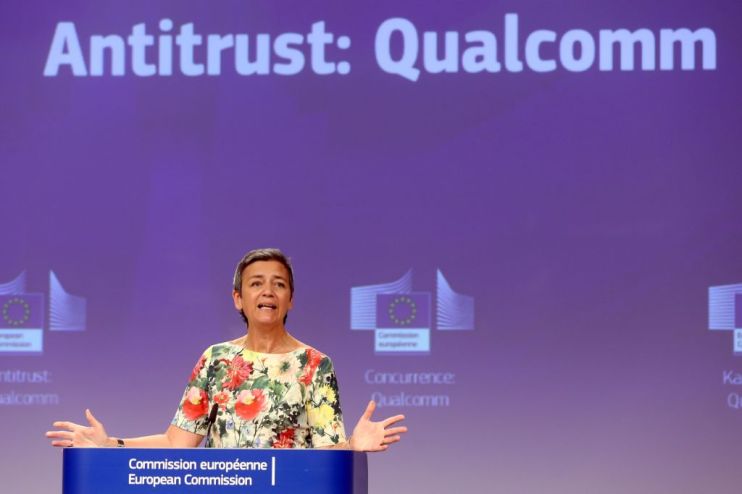EU fines Qualcomm €242m for ‘crushing’ 3G competitor

Chipmaker Qualcomm must pay €242m for abusing its market dominance to crush a competitor in the 3G market, the EU ruled today.
The European Commission said Qualcomm used its iron grip on the chip market to force Icera out of the sector in a breach of antritrust rules.
Read more: Apple settles landmark $27bn legal battle with supplier Qualcomm
Qualcomm underpriced its baseband chipsets – crucial to allow mobile phones to connect to the internet – over a three year period from 2009 to 2011.
The move left its rival with no hopes of competing with the US giant.
“Qualcomm sold these products at a price below cost to key customers with the intention of eliminating a competitor,” said EU antitrust commissioner Margrethe Vestager.
“Qualcomm’s strategic behaviour prevented competition and innovation in this market, and limited the choice available to consumers in a sector with a huge demand and potential for innovative technologies.”
At the time, Qualcomm dominated the 3G chipset sector with a 60 per cent market share, almost three times as large as its nearest competitor.
However, when Icera began supplying chips with a high data rate performance, Qualcomm engaged in so-called predatory pricing to ward off the threat to its market stake.
Qualcomm’s actions “prevented Icera from competing in the market, stifled innovation and ultimately reduced choice for consumers”, the European Commission ruled.
Icera was bought by US behemoth Nvidia in May 2011, which wound down the supplier’s baseband chipset business in 2015.
In May 2011, Icera was acquired by US tech company Nvidia, which decided to wind down its baseband chipset business line in 2015.
Qualcomm’s share price fell 1.3 per cent this afternoon.
Qualcomm blasted the penalty as “meritless” and vowed to appeal the decision.
It claimed the EU based its ruling based on sales to two customers who had picked Qualcomm’s chips “not because of price but because rival chipsets were technologically inferior”.
“This decision is unsupported by the law, economic principles or market facts, and we look forward to a reversal on appeal,” said Don Rosenberg, executive vice president and general counsel of Qualcomm.
“The Commission’s decision is based on a novel theory of alleged below-cost pricing over a very short time period and for a very small volume of chips. There is no precedent for this theory, which is inconsistent with well-developed economic analysis of cost recovery, as well as Commission practice.
“Contrary to the Commission’s findings, Qualcomm’s alleged conduct did not cause anticompetitive harm to Icera, the company that filed the complaint.
“Icera was later acquired by Nvidia for hundreds of millions of dollars and continued to compete in the relevant market for several years after the end of the alleged conduct.”
It is the second tech giant the EU’s antitrust division has targeted in a week as Margrethe Vestager prepares to step down from her role after five years in the job.
Earlier this week Vestager trained her sights on tech behemoth Amazon, claiming the online retailer has abused its dominance in the e-commerce industry.
“We need to ensure that large online platforms don’t eliminate these benefits through anti-competitive behaviour,” she said yesterday.
Read more: EU targets Amazon in e-commerce antitrust probe
“I have therefore decided to take a very close look at Amazon’s business practices and its dual role as marketplace and retailer, to assess its compliance with EU competition rules.”
The Commission will examine whether Amazon’s contracts with third-party sellers affect competition, by allowing Amazon to analyse sales data.